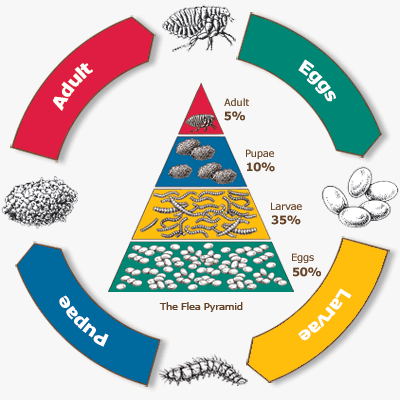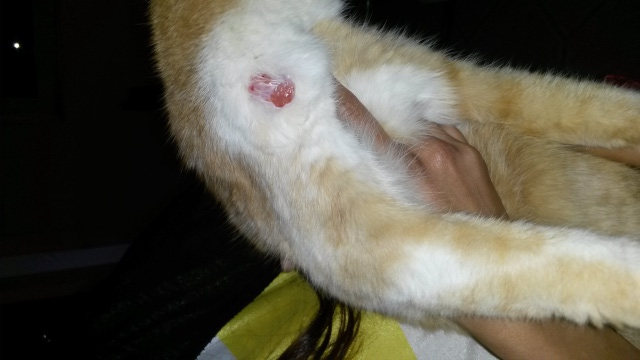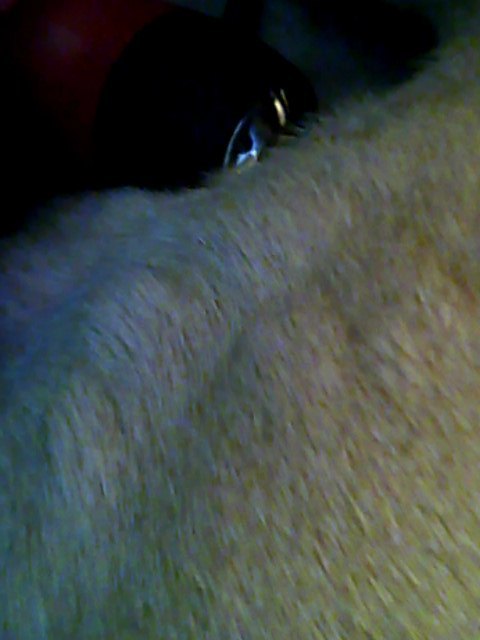QuestionI have a Yorkie that has had loose stools for the past year. She has a protein losing disease (Glomerlophrentis) sp? Her UPC has finally come down to 0.6 - she gets 2.5 m Benazepril 2 x's a day. She weighs 9.5 lbs. She has lost a lot of weigh and recently we saw a specialist who is almost postitive she has IBD. He suggested a endoscope but that is a $1200.00 procedure. I am not thrilled to put her through this, spend that kind of money to find out what "type" of IBD she has. Is this really necessary an would it change our course of treatment? Also vet says possible pancreatitis although I tend to believe with all of this inflammation going on with her IBD that she is mimicking pancreatitis. Her amylase and lipase have been in the 2000 range. Spec cpl has come back at 782.
Recently began home cooking for her May 08 chicken/egg/glut rice. She then became allergic to chicken so 6 wks ago I switched her to lean beef 98/2, white potato and zucc & squash. we had better stools and no diarrhea for a good 2 months. Now I am noticing some mucous in her stool. Someone suggested to feed her a novel protein, and novel carb and very basic low fat diet. So I started feeding her Beef potato and zucc & squash. Fed her that for 6 wks and now she became allergic to the beef homemade diet and her skin even got really red and she had irritation in between the pads of her feet and also a few of her black pads were turning pink around the edges. Vet prescribed Temeral P but then after seeing her Spec Cpl he said to only give it to her when she absolutely must have it. Been giving it to her for 2 days and then taking a week off.
I decided last week to switch her to Buffalo meat and continue with the potato and zucc & squash. Is she going to keep becoming allergic to proteins I feed her?
I am hesitant on the endoscope for this reason- treatment would then possibly require meds such as predisone. I really don't want my dog on predisone.
Someone also HIGHLY suggested feeding a RAW DIET -such as Natures Variety Venison. I am interested in knowing if this would be a good idea. I am not opposed to trying a raw diet as I really do hear great things about a natural/raw diet for dogs. Could raw diet help her ibd and pancreatitis- of course it would be low fat. her kidney values all look good except she has high BUN (78) normal is 7-27 Albumin and Creatinine perfect range and also Liver values perfect as well.
Thanks!
AnswerI see no need for an endoscopy to tell you what kind of IBD she has, because as far as I know there isn't many kinds. They are pretty much require the same type of treatments.
IBD requires a higher fiber, low fat diet. Pancreatitis requires an extremely low fat diet and no changes in it. Raw diets are a ticket to many health problems including bacterial for dogs. With the way her gut is right now and her pancreas being that inflamed, going raw would only exacerbate the problem not to mention that it could cause her to have less resistance to the bacterias found in raw diets.
Raw diets are generally not accepted in the veterinary world because we have seen the research on them and have found them to be imbalanced and unhealthy.
Feeding her what you are without any supplements for trace minerals etc isn't going to help in the long run either. What you need is to find a high fiber- low protein diet for her.
Dogs that have allergies to foods are most likely to be allergic to beef, wheat, chicken, fish and barley. Corn is a rare allergen but it does occur. You said she became allergic to the chicken yet you don't say how you knew this.
Has she been tested for any kind of malabsorption problems?
The symptoms of that are mucousy stool and weight loss.
Providing a diet slightly reduced in protein will substantially reduce the magnitude of proteinuria. Dietary sodium restriction also is recommended due to the tendency of dogs with glomerulonephritis to retain sodium and develop hypertension. Lastly, omega-3 fatty acid supplementation may reduce glomerular inflammation and proteinuria. Fish oil is rich in omega-3 fatty acids and some commercial pet foods, designed for medical management of specific diseases, are supplemented with omega-3 fatty acids.
You have been giving her a basic elimination diet but it also sounds like her allergies or intolerance's are increasing.
My suggestion would be to start trying some prescription diets that are made for these kinds of conditions. Hill's makes a very low protein diet in many forms.
One such diet is Z/D which is ultra low protein in a specially processed way to break down the proteins to make them more available and less allergenic. Here is the page for the diet:
http://www.hillspet.com/hillspet/products/productDetails.hjsp?PRODUCT%3C%3Eprd_i...
The good thing about these diets is that they are balanced and field tested so they are documented as working. Read this page- there is none of the common allergens in this food. It comes in dry. There is Z/D and Ultra Allergen Z/D. These foods take the guess work out of trying to provide her with a diet that won't leave her weaker or cause more problems with her kidneys. It won't upset her pancreas either.
Another novel diet that Hill's makes is D/D Venison and Potato. Here is the link to that:
http://www.hillspet.com/hillspet/products/productDetails.hjsp?PRODUCT%3C%3Eprd_i...
My suggestion would be to ask your vet to get you some of this food and start her on it slowly from whatever she is eating right now.
Try the venison one first and then you can try the Z/D if that causes issues. They also have a Salmon and Potato one.
That would be the first step. Predinsone is contra-indicated in Glomerulonephritis because the use of steroids can actually exacerbate proteinuria.
From the article on glomerulonephritis:
Immunosuppressive drugs The use of immunosuppressive drugs is generally limited to dogs that have developed glomerulonephritis secondary to a steroid-responsive disease, such as systemic lupus erythematosus. Corticosteroids may exacerbate proteinuria and cause additional glomerular lesions; they should be used only with caution and close monitoring. The starting dose of prednisolone is 2.2 mg/kg daily PO with subsequent tapering to 1-2 mg/kg q48h or the lowest dose needed to maintain effect.
http://veterinarynews.dvm360.com/dvm/article/articleDetail.jsp?id=88239
I hope this helps somewhat. Please let me know what you find and how she does on the food. Keep me posted and I hope you find a working solution soon.

 flaky skin and excessive shedding
QuestionQUESTION: Hello! Thank you for reading my quest
flaky skin and excessive shedding
QuestionQUESTION: Hello! Thank you for reading my quest
 Guinea Pigs... what could be wrong
Question
G.PIG
my G.Pig has been scratching his back an
Guinea Pigs... what could be wrong
Question
G.PIG
my G.Pig has been scratching his back an
 Cat with bump on neck/ shoulder
Question
Wound
Hi, I have a 20 year old female
Cat with bump on neck/ shoulder
Question
Wound
Hi, I have a 20 year old female
 Dog has huge raised lumps and is off his food 2 days
Question
Hair covered lumps
Hello,
My ABPT (app
Dog has huge raised lumps and is off his food 2 days
Question
Hair covered lumps
Hello,
My ABPT (app
 Small black bumps on penis
Question
I have a male schnauzer, 5 yrs old. Two
Small black bumps on penis
Question
I have a male schnauzer, 5 yrs old. Two